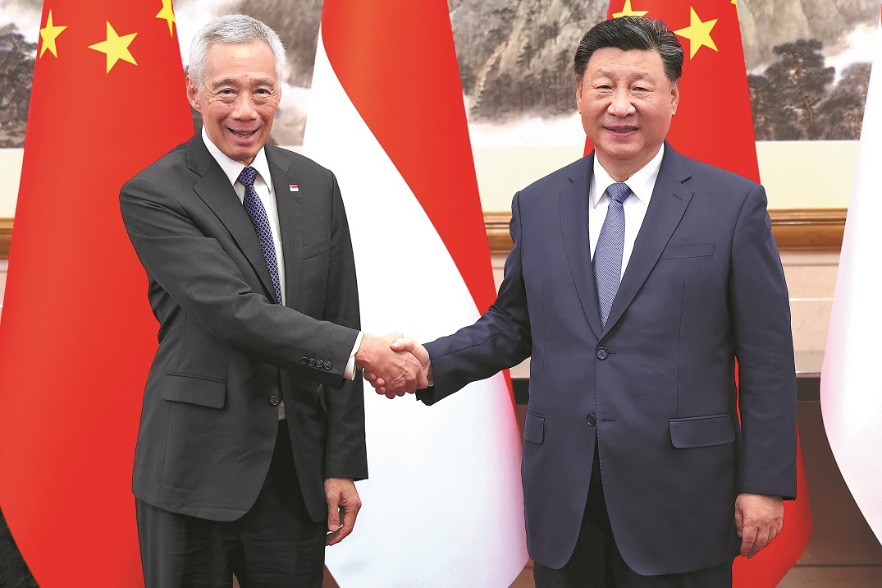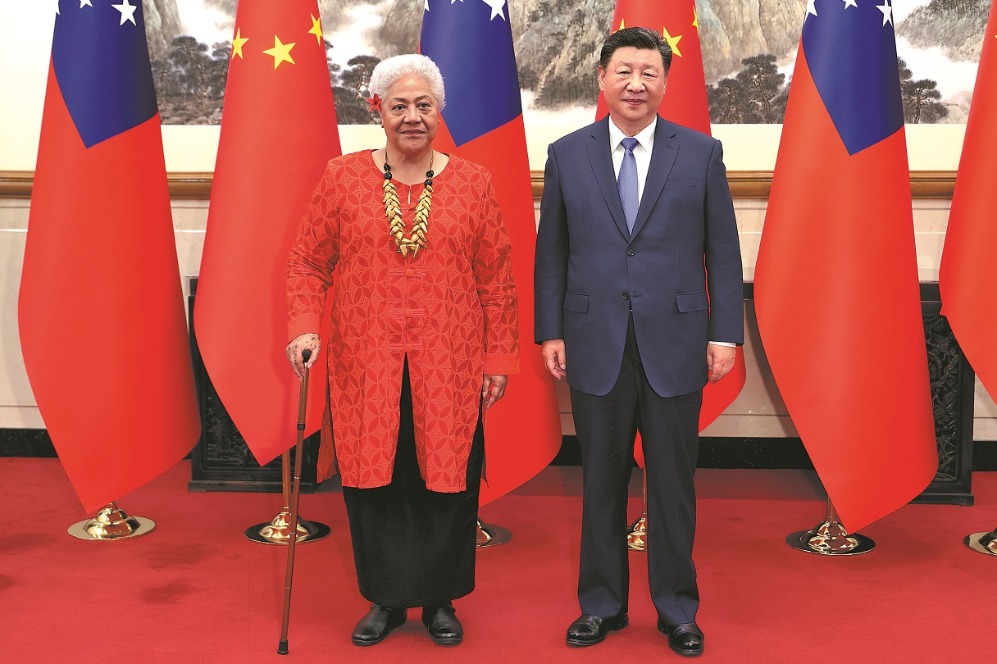UK, China can set example of joint climate action


Global surface temperatures reached record levels in 2024 as the impacts of climate change are being felt around the world. All countries, no matter their development status, are affected by climate change. For example, this month has seen floods in Valencia, Spain, claiming more than 200 lives, and flooding in Colombia causing a state of emergency affecting over 200,000 people.
In China, the rated precipitation in the first three quarters of this year was 10.5 percent higher than in the same period of a normal year, with extreme rainfall, and sudden and frequent floods and climate-related disasters resulting in a large number of casualties, relocation of people and economic losses.
UN climate talks yield good results
Multilateral talks at the Conference of Parties to the United Nations Framework Convention on Climate Change (COP29) in Baku, Azerbaijan, have delivered some progress, especially on climate finance. The just-concluded Baku conference was "finance COP" where a new goal for climate finance was negotiated.
According to the deal, developed countries have promised to contribute $300 billion as climate finance per year by 2035. Though it was far short of the trillion dollars sought by the least- and less-developed countries, it was a hard-won achievement for developing countries.
For the first time the total climate finance includes a possible voluntary contribution from China, which acknowledges its position both as a major economy and a major investor in green technology in developing countries.
The participating countries also agreed to the rules of the carbon market, which should boost market-oriented cooperation on climate and enable businesses to support the recovery of nature and promotion of carbon removal technologies in other countries.
However, there was less progress on climate mitigation aspects. At the COP28 in Dubai, the United Arab Emirates, last year, the participating countries agreed to triple renewable energy capacity by 2030 and transition away from fossil fuels. Yet it was difficult to reach a consensus on the mitigation work program which would continue this progress in Baku, with the participating countries eventually deciding to revisit the issue next year and continue talking meanwhile.
The slow progress on multilateral issues means there is increasing focus on bilateral, sub-national and country-group dialogues that can offer ways to further progress. Amid rising political tensions worldwide, strong bilateral cooperation between the United Kingdom and China can provide the international leadership needed to boost the fight against climate change this decade.
During the COP29 talks in Baku, British and Chinese leaders met at the G20 Summit in Rio de Janeiro, Brazil, and agreed to cooperate on areas such as clean energy and climate change as part of their efforts to address shared global challenges.
Following this meeting, and to support both multilateral and bilateral cooperation, we propose that our expert climate change committees advance our interactions. Our committees have different mandates and institutional structures. Nevertheless, we can collaborate effectively to better advise our countries on how to decarbonize and achieve green transition in a way that creates jobs and boosts the economy.
The UK climate committee recently advised the UK government on its 2035 Nationally Determined Contribution, while the Chinese climate committee is advising the Chinese government on how to achieve its dual carbon goals and minimize climate risks, as well as support the international climate negotiations. Both countries could reach a broader and more practical consensus with support from their respective climate committees.
Sino-British climate cooperation deepening
Supported by the UK's Foreign, Commonwealth and Development Office, China's Ministry of Ecology and Environment and Chatham House, the UK climate science community and policy experts have been collaborating since 2013 in order to better understand the risks posed by climate change, and the policies needed to improve resilience against climate change.
In the last two years, this collaboration has deepened. The two countries' climate committees have jointly explored how to provide constructive advice to our governments across a range of agreed issues of common interest and relevance to our respective national context. We, hereby, propose that our expert committees advance the interaction within their current institutional structures to help us better advise our respective governments.
There is a need to support our countries' efforts to decarbonize their energy supply while ensuring energy security. Both countries have ambitious plans to increase renewable energy generation and our committees can support this effort through their work. The UK, having closed its last coal-fired power station in October, now needs to replace its gas generation with a mix of renewables and energy storage solutions including battery storage and hydrogen. It also needs to rapidly improve its electricity grid to cope with the rising demand for energy, including clean energy.
In China, the demand for energy is still growing faster than the growth of renewable energy generation, but otherwise its challenges are similar to those of the UK, except that renewable, rather than gas generation, will largely be displacing its coal consumption. Both China and the UK are facing the challenge of transforming the energy system, mainly built upon renewable energy. In this regard, the two countries' committees can learn from each other ways to support their countries to build a secure energy system that principally uses renewable energy, so they can add more green energy to their total energy mix against the backdrop of fast changing climate.
Demand for energy to continue rising
The committees can further deepen their collaboration on evaluating climate risks, especially in urban and regional areas, and river basins. We also need to better understand and link climate governance with nature governance. Piers Forster, interim chair of the UK Climate Change Committee, presented the results from the London Climate Resilience Review at two China-led events on the sidelines of COP29, and the UK climate committee is preparing a report on how well can the UK adapt to climate change.
As an expert in the Chinese delegation, Wang Yi, vice-chair of China Expert Panel on Climate Change, was invited to the "China Pavilion" on the sidelines the official events of the UNFCCC, and various events organised by the business communities and social organisations at COP29, to speak on the progress of the climate conference, share China's experience in energy transition, and policies to address climate change and overcome common challenges. Experts and scholars from the UK and China, who have been engaged in cooperation and have attended several UN climate change conferences, shared their research findings and assessment of climate risk assessment, asserting the need to link climate governance with nature management. And by deepening their cooperation, they can improve our climate risk assessments and response.
In order to build a greener, more climate-resilient and inclusive sustainable society, the UK and China should take full advantage of their successful climate cooperation over the past decade to further deepen our cooperation. The two countries could also consider issuing a joint statement to promote the multilateral climate agenda. And workstreams could be set up with focus on clean energy transition, co-governance of climate and nature, reducing climate risks, strengthening climate-resilience, green finance to work together with other countries to promote the green transition in an equitable, just and orderly manner, and facilitate sustainable economic development.
We look forward to the UK and China formally submitting comprehensive and strong NDCs for 2035. By progressing toward these targets, the two sides can set an example for the rest of the world to follow.
Piers Forster is interim chair, United Kingdom Climate Change Committee; and Wang Yi is vice-chair, China Expert Panel on Climate Change. The views don't necessarily reflect those of China Daily.
If you have a specific expertise, or would like to share your thought about our stories, then send us your writings at opinion@chinadaily.com.cn, and comment@chinadaily.com.cn.


































